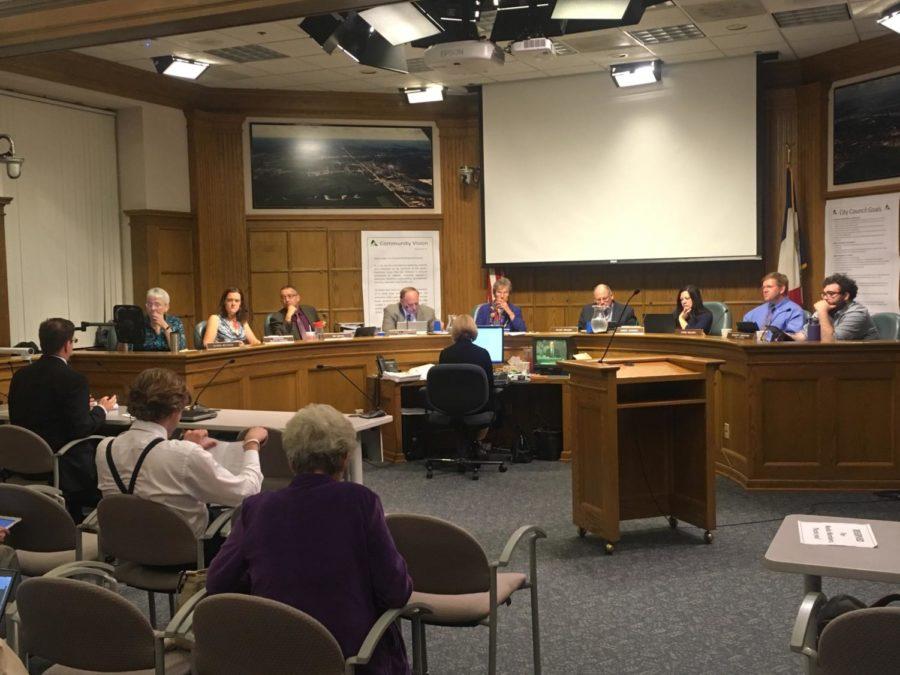Ames City Council stresses community input on occupancy ordinance
Ames City Council considers slight changes in Lincoln Way Corridor implementation plan during their meeting on Sept. 26.
November 6, 2017
A balance.
This is what Ames City Councilwoman Gloria Betcher is searching for in considering the needs of both homeowners and students in the ongoing discussion of occupancy ordinances in Ames.
And with the passage of a six-month moratorium on new rental permits, the City Council hopes to find much needed answers in light of the changing occupancy ordinance.
The rationale for the moratorium is to “provide a temporary means to protect neighborhoods by preserving the current level of rental properties in the city,” according to city documents.
The City Council’s search for answers has also generated many questions, namely how to balance the needs of several different groups.
A long-standing ordinance in Ames states that no rental property could have more than three unrelated people living within it is set to change on Jan. 1, 2018.
The consensus among council members is that the moratorium allows the city time to decide how to address concerns with rental properties having an inappropriate number of tenants. However, the council intends to examine how to achieve more of a balance in neighborhoods between rentals and homeowners, as well.
What makes this quest for answers even more complex is the variation in needs among the groups set to be affected. Students need affordable rent, landlords need to profit and homeowners need peace and quiet.
Councilwoman Gloria Betcher, who is also an adjunct associate professor of English, described the need as “neighborhood stability.” Betcher represents the First Ward, which encompasses much of the student housing immediately south and southeast of campus.
“My take on all of this rental housing is that we need to strike a balance,” Betcher said. “We need to strike a balance between what students need and what homeowners need and what the neighborhoods need. So I see the moratorium as a tool for us to be able to figure out how to balance those needs.”
While landlords and those attempting to sell their houses to them will certainly be dismayed by the moratorium, each group involved is being forced to sacrifice one of their main concerns.
Students will have no new rental properties to choose from for six months.
Homeowners and neighborhood associations will have to accept that houses that already have a rental permit will potentially be increasing the number of tenants, a concern often voiced by Betcher. A concern that is inflamed with the impending disintegration of Ames’ rental occupancy ordinance.
Betcher said she had not thought about the moratorium in terms of who it may affect negatively the most, but said she feels those who may have planned to sell their house to a buyer that wished to turn the property into a rental may be those left in the least fortunate position.
Although the moratorium is temporary, there is no telling how it may or may not affect the rental market in Ames.
Betcher said she did not think the moratorium would have a “tremendous impact” on students. “A lot of people have already signed leases for the entire year.” Betcher cited the same reason for thinking it will not have a large effect on landlords either.
“I think anybody who says that homeowners’ priorities should take precedence is wrong, and anybody who says that students’ needs should take precedence is wrong,” Betcher said.
Councilman Tim Gartin, who represents the Second Ward, feels that the moratorium is a very good example of how city government has to balance the needs of various groups. While Gartin supports the moratorium, he felt it necessary to acknowledge how temporary it is.
“The moratorium is really just a pause button and does not accomplish much long-term,” Gartin said. “It gives the opportunity to formulate long-term solutions.”
Gartin added he was grateful for the hard work and time many citizens put in over the multiple hearings on the moratorium. He stressed the importance of community input in conjunction with heavy lifting from city staff helping the council to arrive at what he feels is a satisfactory result.
Councilman Peter Orazem, who represents the Third Ward, expressed skepticism at how effective the outgoing ordinance was in the first place, but said the moratorium was necessary to limit the uncertainty of those affected by the ordinance.
“Our responsibility as City Council is to make sure that we make the rule changes in an expeditious manner so that we minimize the amount of uncertainty in the market and that was the way to handle it, and I thought that was a reasonable thing to do,” Orazem said.
Orazem expressed hope that both the rule change and moratorium can lead to more desirable long-term solutions.
“If the ‘three unrelated individuals [rule]’ was so successful, why were they getting so many rentals in the first place?” Orazem said. “…Obviously one of the possibilities is by restricting each house to three people, you increase the number of houses you need for that purpose and so coming up with something a little more rational is likely to reduce the pressure on housing.”

















